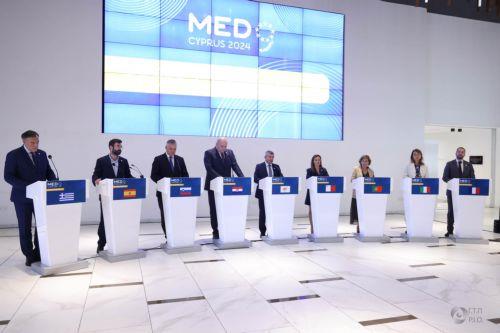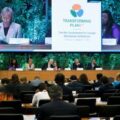(Story by Emilia Christophi of Cyprus News Agency)
The MED9 Energy Ministers reaffirmed their commitment to support the advancement of a sustainable, secure, and resilient future for the Mediterranean region.
In a joint declaration read by the host, Cyprus’ Minister of Energy, Commerce and Industry, George Papanastasiou, the EU Mediterranean countries of Croatia, Cyprus, France, Greece, Italy, Malta, Portugal, Slovenia, and Spain, noted the need for all MED9 countries to access affordable, clean, and sustainable energy and advocated the creation of a collaborative framework and execution of joint actions towards the realisation of a resilient energy ecosystem in the region.
They also proposed the establishment of the MED9 Energy Steering Committee, which includes high-level representatives from all member countries and that will serve as the official platform that plans for and supports energy related activities of the MED9 initiative and plays a pivotal role in the success of its outcomes.
During their second gathering, this time in Larnaca, Cyprus, the participants of the Energy Ministerial Summit reaffirmed “our commitment to support the advancement of a sustainable, secure, and resilient future for the Mediterranean region. This action is in line with the targets set by the European Union with respect to climate neutrality”.
They noted that considering the unique renewable energy potential and climate challenges that characterize our region, “we declare our intention to continue our collaboration towards setting the foundations for the supply of secure and affordable clean energy in the region”.
The Ministers took note of the work that was performed during 2024, in accordance with the 2024 Work Programme, including the establishment of the MED9 Energy Steering Committee, which includes high-level representatives from all member countries. The Steering Committee serves as the official platform that plans for and supports energy related activities of the MED9 initiative and plays a pivotal role in the success of its outcomes. It also noted the efforts of the Energy Steering Committee to secure the support of the European Commission for the preparation of comprehensive studies that will examine the best way to fulfil the ambitious vision of transforming the Mediterranean region into a corridor for green energy trade between EU and non-EU countries as well as the attempts of the Energy Steering Committee to gain access to existing studies that examine the concept of exchange in the region and were commissioned by the Directorate-General for Neighbourhood and Enlargement Negotiations (DG-NEAR) of the European Commission.
The MED9 Energy Ministers decided to take the following steps that include to “reiterate our ambitious vision of transforming the Mediterranean region into a renewable energy hub and corridor for green energy development”, noting that the realisation of this concept, “requires coordinated efforts between MED9 members” and will yield significant benefits for the region, including economic growth, creation of job opportunities, the further integration of EU Member States in the Internal Market and increase in energy security for the Union and the region. In addition, these actions may assist some of the MED9 members to achieve their individual renewable targets set by the EU, as well as contribute to their reindustrialization through competitive renewable energy prices.
They also pledged to examine the creation of synergies between national permitting procedures for renewable energy projects.
The Ministers noted that to further progress towards this shared vision, “we propose the development of a comprehensive and tailored assessment, focusing on the specific opportunities and challenges associated with establishing a Mediterranean green energy hub. We invite the European Commission to collaborate closely with us in undertaking this assessment, subject to resources availability”. They will also evaluate conducting a new, updated, comprehensive study, tailored to the requirements of the region and its energy vision, potentially financed by Member States on a voluntary basis and have requested the support and engagement of the European Commission to potentially carry out the new study, which is expected to build on the findings of the existing reports.
In their remarks, all Ministers underlined the need for close collaboration to turn the region into a green energy hub.
In his remarks, Croatia’s Minister of the Economy, Ante Šušnjar, said MED9 countries should be an example of sustainability and create an attractive environment for private sector, noting one of the challenges is tourism which is an important sector for all Mediterranean economies.
Slovenia’s Minister of the Environment, Climate and Energy, Bojan Kumer said his country is a proud member of the MED9 since 2021 and that today’s meeting was a continuation of the Valetta meeting in Malta. The Mediterranean region is in a perfect spot to become a green energy hub.
Director General of the Energy Agency of Spain, Joan Groizard said “we need to highlight that Mediterranean countries can and must be at the forefront of opportunities in clean energy and technological development.
Greece’s Ambassador, Ioannis Papameletiou said Greece is one of the leading nations in Europe regarding the phase and span of its energy transition. He said in the last four years, Greece has doubled its RES generation capacity, “and we expect we that this will double in 2027-2028”.
He also said the penetration of RES in electricity generation has reached 57% and it is expected to almost 87% by the end of the decade. This accelerated transition did not happen by accident, he underlined but it is due to the constant and systematic efforts. He said Greece has included an ambitious target to incorporate up to 2 KW of offshore wind power in its electricity needs by 2030, thereafter expanding in generation potential to ten kw by 2040 and 17 KW by 2050. The offshore wind power capacity of the Aegean sea, he said, is among the finest in the EU and there is great room for cooperation and exchange of best practices that all can benefit from.
He also underlined the benefits of cross regional electricity interconnectors, that will present the major prerequisites for the success of the Mediterranean energy transition and mutual enhancement of our energy security.
Malta’s Minister for the Environment, Energy and Regeneration, Miriam Dalli, said the MED9 Energy Ministers can really continue with determination to achieve with combined efforts to make the Mediterranean an energy hub. She also said that energy is really the topic which together they can be innovative to ensure peace and stability as well as to ensure prosperity. To do that we need to continue with the European Commission, “we have ambitious targets”.
Portugal’s Secretary of State for Energy, Maria João Pereira said it is very important for Energy Ministers to maintain cooperation to tackle the challenges in front of us. She added that by 2030 RES should be over 50% in the country, adding that “we need to strengthen the infrastructure to accommodate all the potential available”.
Italy’s Ambassador in Nicosia, Federica Ferrari Bravo said that her country is a proud MED9 activist and very much engaged in green energy transition.
She added the area is full of potential and challenges and it is good for the MED countries to be together to confront the challenges ahead in order to achieve affordable energy which is a powerful tool for peace.
The First Counsellor at the French Embassy in Nicosia, Julien Deruffe, said that his country is very committed and wants to focus on more specific projects, how to improve interconnectivity and also how to improve processes to meet the challenges of offshore energy resources.



